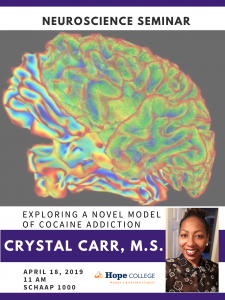 by Kendra R. Parker
by Kendra R. Parker
Welcome back to Hope College, Crystal. Recently, you were at Hope for Brain Day. What are you most excited to share with students, faculty, staff, and community members who will attend your lecture on Thursday, April 18?
My research findings! I have presented some of the results at conferences, but much of the data I will discuss is new.
What’s your current field of study?
The University of Michigan Psychology Department offers a Ph.D. program in six areas of psychology. I am in the Biopsychology area, which is sometimes referred to as Behavioral Neuroscience. We broadly study brain-behavior relationships (the brain is the biology component and the behavior is the psychology component).
So, you’re in STEM, but as an undergraduate did you minor in Women’s and Gender Studies (WGS), and if so, how did your WGS minor/certificate shape you? If not, how did you come to learn about WGS as an academic discipline and how, if at all, does gender impact your research interests?
I did not minor in WGS, but for those interested, The University of Michigan offers several joint Ph.D. programs, with the option to combine Psychology with Education, Social Work, or Women’s Studies. In fact, a few of my colleagues are in the joint Women’s Studies and Psychology program and have shared their research with me. Though I am not jointly enrolled, I have conducted several sex-difference studies and I will share these results during my lecture.
If this does not give too much away before your lecture, what inspired you to research and write on cocaine addiction?
In short, addiction plagued my family. I consider relapse to be one of the most devastating aspects of addiction and I am interested in understanding the neurobiology in order to assist with treatment development. Unlike many other drugs of abuse, there is currently no approved medication to treat cocaine addiction.
Your talk will be on dangers of cocaine addiction, but I am wondering if you speak on any connections to race or gender and why your research is important for dispelling systemic myths about cocaine usage, addiction, and rehabilitation.
There was a time when addicts were considered moral failures, with the logic being they could quit doing drugs if they really wanted. Addiction research has shown that addiction is a brain disease–a distinction that is especially important because it affects social and health policies.
What we know is this: repeated drug use results in neuroadaptations that contribute to compulsive drug use and a high propensity to relapse. The “telescope effect” refers to the observation that women typically transition to addiction faster, whereas women are seen for treatment sooner after first use and present with more severe addiction symptomology. This knowledge and understanding are critical to dispelling stereotypes and myths.
What advice would you give to current Hope students, but Black women students especially, who are enrolled in STEM courses or who are interested in graduate school? Any words of wisdom?
Great mentorship surely makes a difference!
In undergrad, I completed a plethora of biology courses, a neuroscience course, and even chemistry. While these courses were challenging, they provided a great foundation for my current degree. Although my Bachelor’s of Science degree is in Psychology, I spent a great deal of time in the Biology Department at Tuskegee Insitute, and I established relationships with the faculty, including Dr. Gerald D. Griffin.
So, as we wrap up a bit, tell me—what’s on your bookshelf these days? What’s the one book you recommend that we read—and why?
For those who are interested in learning more about addiction, I would certainly suggest Dr. Carl Hart’s book, High Price: A Neuroscientist’s Journey of Self-Discov ery That Challenges Everything You Know About Drugs and Society. Hart’s prologue details an experiment he conducted in 1999 that gave “experienced and committed” crack users the choice between a hit of crack cocaine and an alternative reinforcer (five dollars). Hart paints a vivid scene that ends in an unexpected outcome: after having sampled the dose, the participant, a thirty-nine-year-old Black man who worked as a street bookseller, chose the cash.
ery That Challenges Everything You Know About Drugs and Society. Hart’s prologue details an experiment he conducted in 1999 that gave “experienced and committed” crack users the choice between a hit of crack cocaine and an alternative reinforcer (five dollars). Hart paints a vivid scene that ends in an unexpected outcome: after having sampled the dose, the participant, a thirty-nine-year-old Black man who worked as a street bookseller, chose the cash.
We really appreciate Crystal for taking the time to share with us! Intrigued? Want to learn more? Join us tomorrow at 11AM in Schaap 1000. Crystal’s event is free and open to the public.

